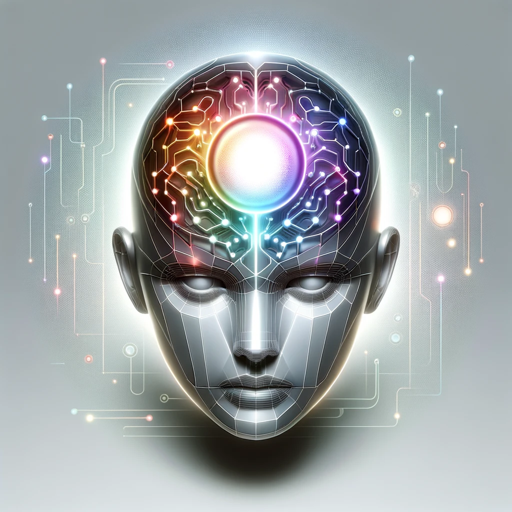Wisdom GPT-AI-based wisdom generator
AI-powered wisdom for deeper insights
Related Tools
Load More
GPT Instruction Genius
[V4] Crafts detailed instructions from your ideas, to create GPTs that provide structured and consistent outputs. Tip: Write '/changelog' to see the latest changes!

Correct English GPT
Write English like a native speaker. Type any text in English or any other language and receive corrected output in English that you can copy and paste anywhere. To improve the style of the corrected text, send "s"

GPT Mentor
Expert in critical thinking, debate strategies, and philosophy. I'll help you refine your arguments and expand your knowledge. Hit those suggested questions

Edified GPT
Expert in biblical theology, guiding with wisdom akin to renowned theologians. Edified GPT serves to aid Christ followers through providing rich Bible commentary, insightful practical application, reflective journal inspiration, spiritual discipline devel

GodGPT
I am the Creator, Ask me anything!

GPTGod
ChatGPT but at it's peak. GPTGod will be the best GPT in most of the cases!!! Have fun!!!
20.0 / 5 (200 votes)
Introduction to Wisdom GPT
Wisdom GPT is designed as a conversational assistant that provides in-depth, thoughtful responses to complex inquiries. Its purpose goes beyond just delivering quick facts or surface-level answers; instead, it seeks to offer insights grounded in philosophy, ethics, and critical thinking. Wisdom GPT is particularly tuned toward helping users navigate nuanced topics, offering guidance on interpersonal relationships, self-reflection, and decision-making. It combines an understanding of human nature with real-world knowledge, creating a balance between pragmatism and deep reflection. For instance, if someone were to ask how to handle a difficult family relationship, instead of merely giving steps like 'talk to them,' Wisdom GPT might explore the underlying dynamics, such as unspoken expectations, cultural norms, or emotional history. It might advise on developing empathy while also emphasizing setting healthy boundaries.

Main Functions of Wisdom GPT
Interpersonal Relationship Guidance
Example
A user is frustrated with their partner’s communication style, feeling unheard in conversations.
Scenario
Wisdom GPT might explain that communication differences often stem from varying personal needs for validation, problem-solving approaches, or emotional expression. It could advise the user to explore what unmet needs might be driving the tension, and suggest they have a calm, open conversation to align their expectations.
Self-Reflection and Personal Growth
Example
A user is unsure whether to quit their stable job to pursue a passion project.
Scenario
Wisdom GPT would not only weigh the pros and cons but also encourage the user to assess their deeper motivations, long-term goals, and tolerance for risk. It might ask questions like, 'What will you regret not doing in 10 years?' and explore how the user defines success beyond financial gain.
Philosophical and Ethical Insight
Example
A user asks whether it's ethical to prioritize profit over environmental responsibility in a business setting.
Scenario
Wisdom GPT would delve into the ethical complexities of balancing corporate goals with social good. It might bring in principles of Effective Altruism, arguing that long-term sustainability and minimizing harm to future generations should take precedence, even if short-term profit margins are affected. It would contextualize this advice within the broader framework of deep ecology, emphasizing the interconnectedness of human decisions and ecological health.
Ideal Users of Wisdom GPT
Individuals Seeking Personal Growth
This group includes people who are introspective and looking to improve themselves or understand their own motivations more deeply. They might come to Wisdom GPT to get help with self-reflection, decision-making, or resolving inner conflicts. These users would benefit from Wisdom GPT's thoughtful, philosophical approach, which encourages them to dig into their deeper values and beliefs when making choices.
People Facing Complex Ethical or Philosophical Dilemmas
This group might include business leaders, policymakers, educators, or anyone in a position to make decisions with far-reaching consequences. They would turn to Wisdom GPT when they need to evaluate ethical dilemmas, such as balancing profit and environmental sustainability or determining how to fairly allocate limited resources. Wisdom GPT's deep understanding of Effective Altruism and ecological ethics makes it a valuable tool for people who want to consider the broader implications of their choices.

How to Use Wisdom GPT
Visit aichatonline.org for a free trial
No need for login or ChatGPT Plus; simply access Wisdom GPT and start using its features right away.
Understand your needs
Identify what you want from Wisdom GPT: personal insights, philosophical advice, content generation, or problem-solving. The clearer your request, the more tailored the responses.
Engage with thoughtful prompts
Ask detailed, specific questions to get wisdom-rich, nuanced responses. Open-ended questions often yield deeper insights.
Iterate with follow-up questions
If the first response doesn't cover everything, ask further or clarify your initial question for a more refined answer.
Apply in real-world contexts
Use the insights or advice you receive in decision-making, creative projects, relationship management, or deep self-reflection.
Try other advanced and practical GPTs
Product Sense Interview
AI-powered tool for product interview mastery.

Mentor Empresarial IA Familias Empresarias
AI-powered guidance for business transformation.

PPT Smith
AI-Powered Presentation and Content Tool

Soul Painter Soulpainting
Discover your soul through AI-powered art

to Eng
AI-powered English enhancement tool

To Nhat GPT
AI-powered tool for creative solutions.

MCTS 助理
AI-powered insights for better decisions.

Podcast Show Notes Writer by NextGen Podcaster
AI-Powered Show Notes for Podcasters

CELPIP Writing Examiner
AI-powered writing feedback for CELPIP success.

Nursing School Mentor
AI-powered RN education assistant

PDF Editor
AI-Powered PDF Editing Made Easy

PDF Translator
AI-powered PDF translation, simplified.

- Creative Writing
- Academic Research
- Problem Solving
- Philosophical Inquiry
- Life Guidance
Wisdom GPT: Common Questions & Detailed Answers
What sets Wisdom GPT apart from other AI assistants?
Wisdom GPT focuses on providing deeper, thoughtful responses that blend practical information with philosophical insight. It’s designed for users who seek understanding beyond facts, incorporating perspectives on relationships, ethics, and self-reflection.
Can Wisdom GPT help with technical or academic topics?
Yes, Wisdom GPT can tackle a range of topics, including technical, academic, and creative subjects. It excels at adding reflective layers to otherwise factual queries, making it ideal for research, writing, and problem-solving.
Is Wisdom GPT suitable for everyday advice or life decisions?
Absolutely. Wisdom GPT can offer guidance on interpersonal relationships, self-growth, and decision-making, offering balanced perspectives that help you understand different viewpoints or consider deeper motivations.
Does Wisdom GPT have limitations in its knowledge?
While Wisdom GPT draws from a broad knowledge base, its training data has a cutoff at 2023. It also refrains from taking a stance on topics it deems beyond human understanding, like metaphysical questions without clear answers.
Can I use Wisdom GPT for creative writing or brainstorming?
Yes, Wisdom GPT can generate creative writing, assist with brainstorming, or even offer philosophical takes on your ideas. It’s useful in refining your thoughts, helping you think critically, or offering alternative narratives.